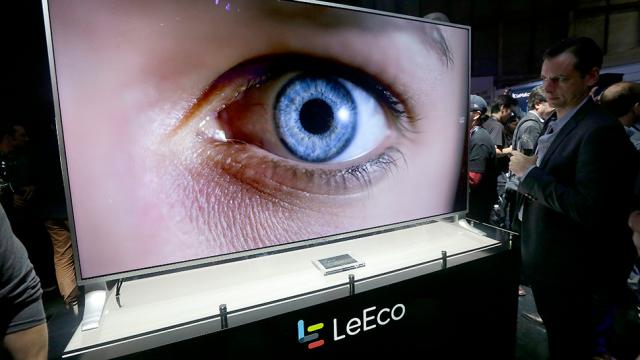Photo: AP
By many accounts, LeEco was set to be the next major player in the US tech market. But its bank accounts indicate that this won’t be the case. Everything is going south for the Chinese startup and in the latest blow, Vizio is suing the company for $US60 ($78) million. Vizio claims that LeEco executives misrepresented its finances in a failed acquisition deal.
LeEco had its hands in everything. Movies, electric cars, VR, smartphones, TVs — you name it, LeEco was making it. And it was doing well in China. Then the company tried to expand into the US and everything unravelled. Executives admitted in November that the company was growing too fast. The solution? Just get bigger. A $US2 ($3) billion acquisition of TV giant Vizio was announced. Then it was unannounced. The two companies said at the time that “regulatory headwinds” had caused them to call it off, but don’t worry, they said, they’re working on a partnership. Now, Vizio has dropped all pretenses and is calling out LeEco for allegedly being a dishonest deadbeat company.
The lawsuit filed by Vizio on Tuesday claims that LeEco owed a $US100 ($130) million buyer-termination fee when the acquisition fell through. According to court documents, LeEco arranged a partnership with Vizio that required a payment of $US40 ($52) million up front, $US10 ($13) million at a later date, and a $US50 ($65) million investment in a joint venture that would give Vizio better access to the Chinese market. Vizio claims that it received the $US40 ($52) million and LeEco representatives have been “radio silent” when contacted about the rest of the deal.
The PR spin about “regulatory headwinds” is out and Vizio claims that executives from LeEco misled them about available finances. According to the suit, LeEco:
desperately needed to either obtain the instant financial stability, credibility, and resources that a merger with Vizio would bring, or at least to create a widespread and dramatic public impression of their own financial health and well-being to grow or continue in business that would come with the announcement of such an intended merger.
Vizio further alleges that LeEco hoped to use Vizio’s connections and private customer data for its own purposes. From the suit:
[LeEco] concocted a secret plan, at or about that time, to use [the] publicly announced intended merger with VIZIO to gain or try to obtain access to VIZIO’s large corporate customers and key decision makers thereat for their own purposes and by means of confidential customer information that had been developed … and provide LeEco with access to VIZIO’s confidential customer information, including contact information, account history, purchasing needs or requirements, contract terms, and the like.
LeEco’s founder and CEO Jia Yueting, SVP of Finance, a director of LeEco’s holding company are all specifically named as executives that misled Vizio in the course of the merger.
The suit is targeting Le Technology, a California-based subsidiary. In the event that the China-based LeEco is found guilty, Vizio could have a hard time collecting that money. Jia Yueting had $US182 ($237) million in assets frozen by a Chinese court last week. The CEO is also heavily invested in the floundering automaker Faraday Future, which had its own disasters this week. Throw in the $US6 ($8) billion in capital that was raised for LeEco’s expansion and there could be enough debt on the books to make the company worth less than a mid-range Vizio television.
One also has to ask how this happened to Vizio. The company is hugely successful in the US, and the original acquisition deal could have been ruinous to its future. Why did Vizio announce the agreement before understanding its partner’s finances? When billions are involved, sometimes it seems like common sense just flies out the window.
